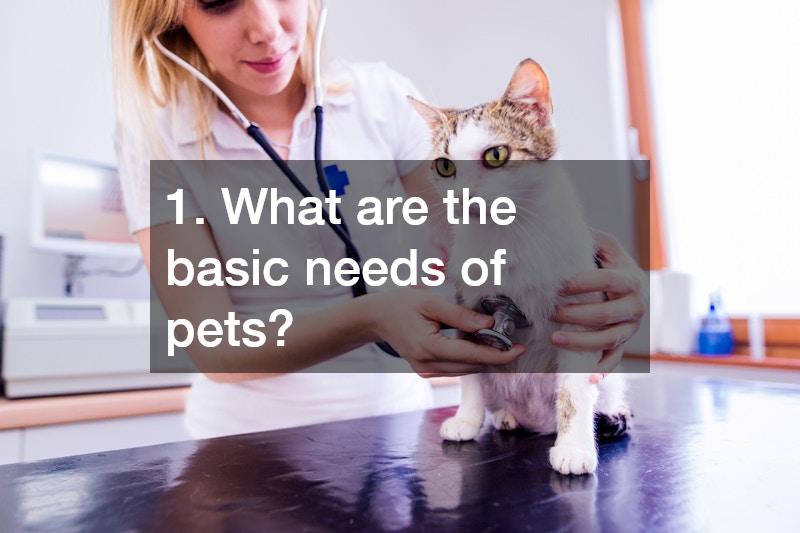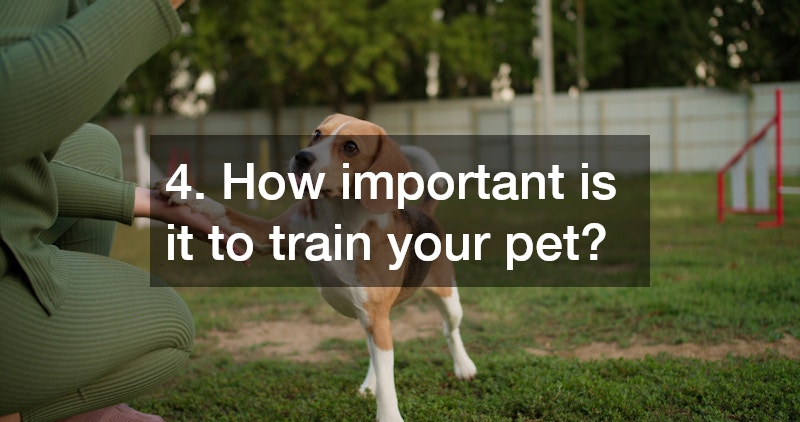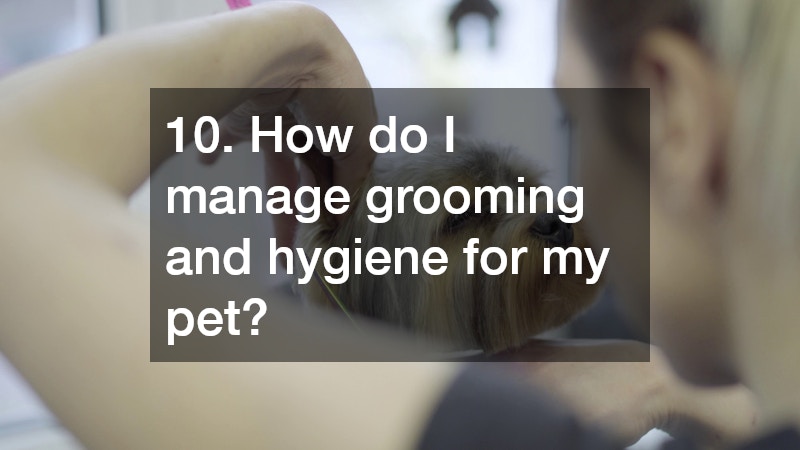Being a responsible pet owner involves much more than just providing your pet with food and water. It means taking on the responsibility of tending to your pet’s comprehensive needs to ensure they live a happy and healthy life. Pets can vastly enrich our lives, and in return, they depend on us for care, love, and attention. This article will delve into how to be a responsible pet owner by highlighting ten essential tips that cater to the various aspects of pet care. From understanding their basic needs to managing their diet and exercise, each of these facets contributes to the well-being of your pet. By following these guidelines, you’ll be well-prepared to offer the best possible care to your furry (or feathered, or scaly) friend, ensuring a long and happy companionship.
1. What are the basic needs of pets?

To understand how to be a responsible pet owner, one must first recognize the basic needs of pets. Just like humans, pets require food, water, shelter, and exercise. Providing a balanced diet, such as the appropriate pet food for their species and age, is crucial. Access to fresh water at all times is a necessity. Their living environment should be safe, comfortable, and nurturing. Regular veterinary check-ups are also essential to monitor health and prevent disease. Pets need mental stimulation and social interaction to thrive, which includes playtime, training, and affection.
Another aspect to consider is the availability of a local emergency vet, which is crucial in case unexpected health issues arise. Knowing the nearest local emergency vet can be life-saving for your pet in times of urgent care needs. Moreover, understanding the specific needs of your pet, whether you’re using Maine Coon supplies for cats or specific accommodations for reptiles, plays a vital role in their happiness and health.
Ensuring that a comprehensive safety plan is in place, such as ensuring a secure environment through residential fencing, keeps pets away from harm. Misadventures can occur, and appropriate preventive measures can make all the difference. Your commitment to fulfilling these basic needs lays the groundwork for being a responsible pet owner who truly cares for their pet’s overall well-being.
2. How often should pets visit the veterinarian?
Regular visits to local veterinarians are an integral part of how to be a responsible pet owner. Pets need routine check-ups to maintain good health, preventing disease and catching potential health issues early. Most veterinarians recommend annual visits for healthy pets, but the frequency may increase based on age, breed, or existing health conditions. Vaccinations, dental care, and parasite prevention are also important aspects of veterinary care. Responsible owners should ensure pets are up to date on all required vaccines, which protect both the pet and the public. Dental health is often overlooked but can lead to serious complications if ignored, so regular cleanings and check-ups are vital. Flea, tick, and worm prevention treatments should be administered year-round as advised by the vet. In addition, discussing behavioral concerns, nutrition, and weight management during vet visits ensures pets live longer, healthier lives.
Puppies, kittens, and senior pets usually require more frequent visits to monitor their growth, developmental needs, and age-related conditions. Additionally, a visit to a local veterinarian ensures your pet is up to date on vaccinations and flea, tick, and heartworm prevention. Establishing a relationship with a trusted veterinarian can help tailor your pet’s healthcare plan.
Remember that the need for a local emergency vet can never be overlooked. Having this information on hand provides peace of mind that you’re prepared for any unexpected health emergencies. Regular vet visits are an essential aspect of pet ownership and help ensure your furry friends live long, healthy lives.
3. How can I keep my pet safe at home?
Providing a secure home environment is paramount when learning how to be a responsible pet owner. Residential fencing plays a crucial role in achieving this, as it keeps pets contained and safe from external dangers like traffic or other animals. Safety measures should be tailored to the specific needs of each pet’s species and personality.
Inside the home, it’s important to pet-proof areas to prevent accidental injury or ingestion of harmful substances. Keep toxic plants, household chemicals, and small objects out of reach. For young pets or those with behavioral issues, securing trash cans and utilizing baby gates can help mitigate potential hazards.
Furthermore, providing ID tags or microchipping your pet adds an extra layer of security, increasing the chances of being reunited in case they go missing. Safety at home encompasses more than physical boundaries; it’s an aspect that reassures that your responsibilities as a pet owner extend to vigilance and proactive measures.
4. How important is it to train your pet?

Training is a pivotal part of understanding how to be a responsible pet owner. Many behavioral problems can be avoided or mitigated with proper training. Dog training courses, especially those that use positive reinforcement techniques, not only teach pets important commands but also strengthen the bond between owner and pet.
Consistent training is essential, starting from basic commands like “sit,” “stay,” and “come.” Beyond obedience, training helps establish boundaries and routines, which is particularly important in multi-pet households or when integrating larger animals like horses through horse boarding systems. Keeping a firm but loving guidance helps modify undesirable behavior, making living together more harmonious.
A well-trained pet is not only happier but safer, as they are better equipped to handle various situations. Incorporating training into your pet’s routine demonstrates commitment to their lifelong well-being. It requires patience and dedication, but the rewards are numerous for both the pet and the owner.
5. How can I ensure my pet gets enough exercise?
Exercise is indispensable to pet health and a fundamental part of being a responsible pet owner. The required level and type will vary with the breed, age, and size of your pet. Dog walking, play sessions, and dog boarding services that encourage physical activity are all excellent ways to incorporate more exercise into your pet’s routine.
Cats, birds, and small mammals also need stimulation; toys and safe areas in which they can play and explore satisfy their natural instincts. It’s important to note that some pets may require specific exercises due to health constraints; consulting with a local veterinarian can provide personalized guidance. Fitness is key to maintaining a healthy weight, reducing anxiety, and preventing illnesses.
Horse boarding professionals often offer exercise plans as part of their care services, ensuring larger animals receive adequate physical activity. Integrating exercise into your pet’s life involves being aware of their specific needs and making time for them, which is crucial for the responsible pet owner who wants to nurture a happy and active companion.
6. How do I manage and improve my pet’s socialization?
Socialization is a critical consideration for those learning how to be a responsible pet owner. Exposing pets to a variety of environments, people, and other animals helps reduce fear and anxiety, making them more comfortable and adaptable. Puppy socialization classes are particularly beneficial, as they encourage healthy interaction in a controlled setting.
Understanding your pet’s body language and respecting their boundaries is important when introducing new experiences. Horse boarding centers often emphasize socialization as part of the care process, as it helps create well-adjusted and calm animals. With proper socialization, pets become more confident and less prone to stress in different situations.
It is equally essential to provide enrichment through playdates, dog parks, or time out in natural environments, while ensuring each encounter is positive and stress-free. Observant pet owners can discern when their pet is ready to socialize and respect their needs during the process. The goal is to create a well-balanced pet, comfortably interacting within and outside the home.
7. What should I consider when choosing pet toys and accessories?

Selecting the right toys and accessories for your pet is an aspect of how to be a responsible pet owner that requires thoughtfulness. Factors like the pet’s size, play style, and chewing habits should all influence your choice. Toys should be durable and safe to withstand the pet’s level of play without causing injury.
When choosing items like Maine Coon supplies, ensure they are suitable for the breed’s specific needs, taking their size and unique characteristics into account. It’s also wise to rotate toys to maintain interest and prevent boredom. Interactive toys can provide mental stimulation, a vital component for a pet’s cognitive development and emotional well-being.
Accessories such as leashes, collars, or bedding should provide comfort and be of appropriate size. Regularly inspect and clean toys and accessories to ensure they remain safe for your pet to use. By dedicating time and resources to selecting the right items, you actively contribute to enriching your pet’s life and ensuring their happiness.
8. How do I travel with my pet safely?
Many pet owners face the challenge of traveling with their animals, and knowing how to do so safely is an important part of how to be a responsible pet owner. Whether on short trips or long excursions, adequate preparation is key to ensuring your pet’s safety and comfort. Choosing a sturdy, well-ventilated carrier is crucial for smaller pets, while securing larger animals like dogs with harnesses in vehicles prevents accidents.
Ensure your pet is comfortable with the mode of travel beforehand to reduce anxiety. Regular breaks during long journeys allow for water, food, and toilet opportunities. Research pet-friendly accommodations if planning an overnight stay, and ensure you’re aware of any local wildlife control measures if your destination requires it.
Familiarize yourself with relevant guidelines related to traveling with pets, such as airline policies or public transportation rules. Consider using professional dog boarding services if travel isn’t feasible for your pet, thus avoiding unnecessary stress or discomfort. Thoughtful planning demonstrates dedication to your pet’s well-being and highlights your preparedness as a responsible pet owner.
9. What should I do about my pet’s diet and nutritional needs?
A well-balanced diet is integral to learning how to be a responsible pet owner and ensuring the health and longevity of your pet. The right nutrition depends heavily on factors such as age, weight, breed, and medical history. Collaborating with local veterinarians can provide a diet plan that meets your pet’s specific nutritional needs.
Pets require different nutrients at different life stages, so an awareness of this can guide changes in diet. Puppies, kittens, and senior pets may require food with different nutrient profiles to support their developing and aging bodies. Ensure fresh water is always accessible and be mindful of portion control to prevent obesity.
Paying attention to ecological factors, like implementing local tick control services during months of risk, further complements your pet’s health strategy. Moreover, introducing variety into your pet’s diet through treats or supplemental foods while avoiding harmful human foods keeps them healthy and engaged. Thoughtful nutritional care is a testament to your commitment as a responsible pet owner.
10. How do I manage grooming and hygiene for my pet?

Maintaining your pet’s grooming and hygiene is another facet of understanding how to be a responsible pet owner. Regular grooming keeps your pet looking and feeling their best. The frequency and type of grooming can depend on the pet’s breed and coat type, with many owners utilizing professional pet grooming services to help manage complex grooming routines.
Common grooming practices include bathing, brushing, nail trimming, and ear cleaning. Regular cleaning prevents issues such as matting, shedding, and skin conditions. Using quality haircare products, especially tailored Maine Coon supplies for long-haired breeds, ensures that your pet’s coat stays healthy and glossy.
Cleanliness extends to the pet’s living environment as well. Regularly washing bedding and maintaining a clean habitat reduces the risk of parasites or infections. Grooming is as much about health as it is about hygiene, making it a crucial aspect of pet care that should not be overlooked by any responsible pet owner.
Becoming a responsible pet owner
Becoming a responsible pet owner is an ongoing process requiring commitment, patience, and attentiveness to detail. The rewards of having a healthy and happy pet are immeasurable, as they enrich our lives in countless ways. By implementing these ten essential tips into your daily routine, you’ll pave the way for a fulfilling relationship with your pet, ensuring that they receive the best care possible and enjoy life as a valued member of your family.



